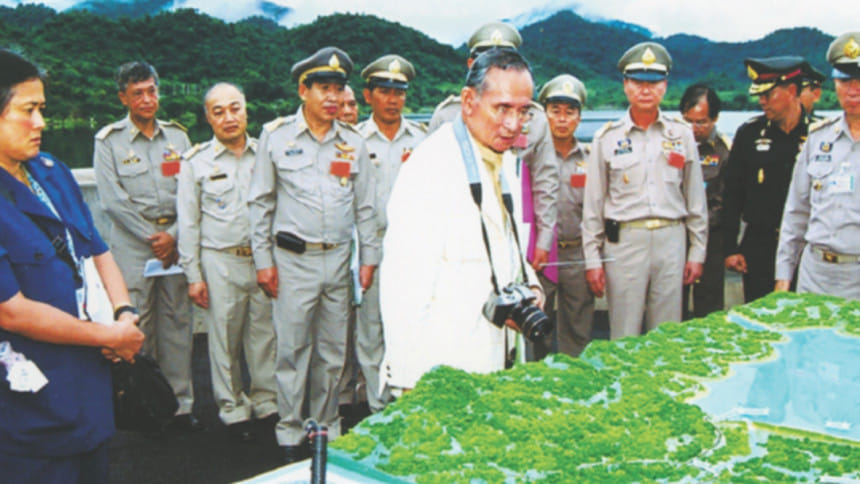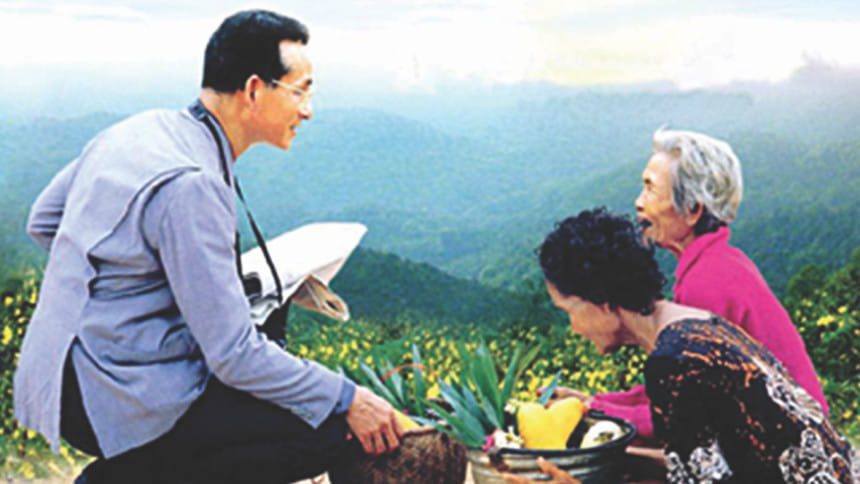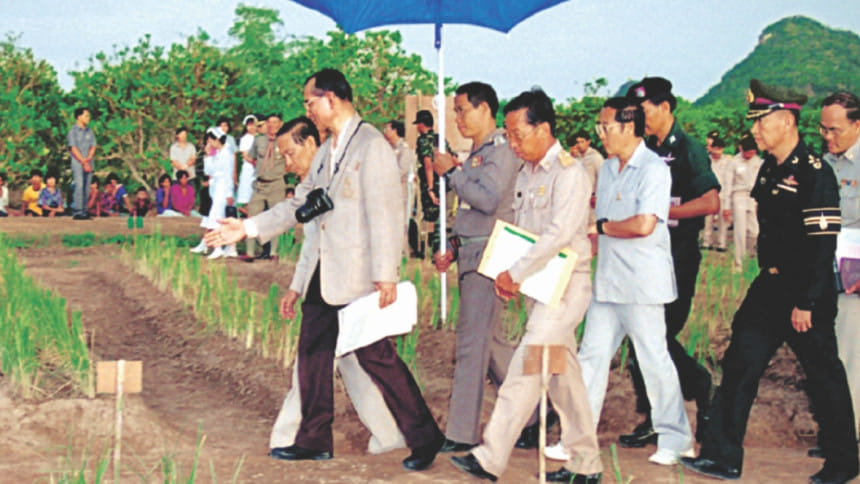KING BHUMIBOL

No one in the history of the Kingdom of Thailand has done so much to improve the well-being of its people as His Majesty King Bhumibol Adulyadej, also known as Rama IX. He has initiated literally thousands of development projects that have greatly benefited the country and its people. His reign spanned the terms of more than 30 governments, several military regimes, coups and numerous coup attempts, and even the defeat of the communist threat that raged through Southeast Asia a few decades ago.
“We shall reign with righteousness for the benefits and happiness of the Siamese people.”
This declaration, spoken by His Majesty at his coronation ceremony was his first public pledge to promote the welfare of all his subjects. Throughout his 65-year reign he has fulfilled this promise to the letter. Early on His Majesty was inspired by the example of his parents to work tirelessly to improve the lives of the Thai people. Although most of his childhood was spent in the West, he was taught to be aware of his roots and his debt to the motherland. This attitude formed a solid foundation for a deep understanding of Thai society.

In the early days of his reign His Majesty made many visits to rural areas throughout Thailand. Accompanied by Her Majesty Queen Sirikit, His Majesty visited the least developed areas of the country to see how the people lived. The royal couple travelled to every part of the country, visiting villagers and learning of their living conditions, problems and needs at first hand.
His Majesty would then begin the process of devising schemes and projects to resolve their troubles and improve their condition. Scenes of His Majesty sitting on the ground or standing shoulder to shoulder with his subjects, engaged in conversation, became a familiar sight that touched all Thai people.
To His Majesty, the people's problems are also his, and so he has never stopped striving to make their lives better. It is for that reason the people proclaimed their King “Father of the Nation” and the monarchy has become a rock solid institution, ensconced firmly in the hearts of the Thai people.
His Majesty truly deserves to be called the Developer King for his dedication to alleviating the people's hardships and improving their quality of life.
Royal Development Projects
The Royal Development Projects (RDPs) were directly inspired by the insight His Majesty gained while visiting rural areas. He realized that any projects that truly improved the lives of the people must go hand in hand with protection of the environment and sustainable use of natural resources.
The first initiative to help people was initiated in 1951, when His Majesty authorized the Department of Fisheries to acquire Tilapia mosambica fish from Penang through the UN's Food and Agriculture Organization. The fish were initially raised in the pond at the Ambarra Villa of the Dusit Palace in Bangkok. On November 7, 1953, His Majesty distributed the fingerlings to village and district leaders throughout the country for propagation and further distribution among the rural people in order to provide them with an alternative source of protein.

The first RDP which directly emphasized rural development emerged in 1952 when His Majesty donated a number of bulldozers to the Naresuan Border Patrol Police unit for construction of a road leading to Huai Mongkol Village in Hua Hin district of Prachuap Khiri Khan province. This was to enable the villagers to easily commute and transport their produce for sale in markets outside the village.
Since 1952, His Majesty initiated more than 3,000 innovative programmes in agriculture, environment, public health, water resources, communications, public welfare, occupational promotion and education with the aim of easing the lives of Thai people. Some of the most important are as follows:
Royal Rain Project
His Majesty is often associated with life-giving rain because of his pioneering work in cloud seeding techniques. Since 1971, the methods he developed have been used to bring drought relief to farmers and to increase water reservoirs, earning international patents and interest from foreign countries.
Moisture Retention Dams
To maximize the use of Thailand's annual monsoon rains, His Majesty designed a system of small “check-dams,” which regulate the flow of water. The creation of multiple small reservoirs gives farmers immediate benefits and also replenishes groundwater.
Royal Projects
In 1969, the King introduced a comprehensive program to assist northern hill tribe people engaged in unsustainable farming practices. By training the hill tribe communities in the production of various handicrafts, these programs have raised their income and their prospects, and at the same time have benefited the environment.

Pa Sak Jolasid Dam Project
To help the farmers of Thailand's central plains to exploit fully the waters of the Pa Sak River, His Majesty initiated a development project that created a new reservoir for water conservation and controlled irrigation. The dam has also helped with flood prevention on the outskirts of Bangkok.
New Theory on Managing Agricultural Land
Combining concepts of water management with local control, His Majesty developed a strategy that promotes individual household reservoirs over large communal ones, maximizing versatility while minimizing costs. Overall agricultural production is boosted without the need for public funds.
Use of Vetiver to Prevent Soil Erosion
To help stop the effects of soil erosion, the King initiated a program to plant certain varieties of vetiver grass, known for its ability to reduce siltation and stabilize soil. The systematic application of the program has proven effective in maximizing productivity and conserving precious water.
The Chaipattana Aerator
Concerned with the quality of water in the Kingdom, His Majesty developed a device that keeps water oxygenated and healthy. Its simple design and low cost make it easy to build and maintain, thus facilitating wide application nationwide.
Pak Phanang Project
To stem the deterioration of the naturally fertile Pak Phanang River basin due to unmanaged population growth, His Majesty initiated co-operation between government agencies to use more effective agricultural resources, maximize economic gain, and reduce harmful environmental practices.
Renewable Energy
Long before the need for renewable biofuels was widely apparent, His Majesty was actively researching the resource potential of locally-made palm oil. The resulting biodiesel has become a standard additive in the nation's fuel, and its local sourcing is an inspiration for ongoing research.

 For all latest news, follow The Daily Star's Google News channel.
For all latest news, follow The Daily Star's Google News channel. 



Comments